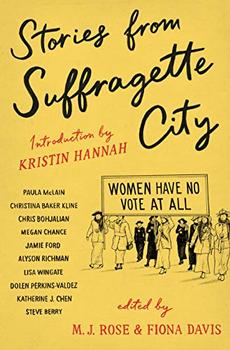Summary | Excerpt | Reading Guide | Reviews | Beyond the Book | Readalikes | Genres & Themes | Author Bio

This excerpt includes the full text of Lisa Wingate's short story, "Apple Season"
Introduction
KRISTIN HANNAH
I still remember the first time I voted for the president of the United States. It's such a crucial rite of passage, a pivotal pause on the road to adulthood. I remember reading newspaper articles in detail, listening to speeches, asking opinions of everyone I respected. I wanted desperately to be informed. I was in college at the time, at a large public university, and the upcoming election was big news. We painted posters and canvassed neighborhoods and put politics first in the school newspaper. Groups gathered after class to galvanize voters and encourage others to get involved. And then there was the actual day: walking into the room, presenting my voter registration card, and—at last—casting my vote.
But did I think about how I came to be casting my vote? At that age, I doubt it (although I'm sure my mother tried to tell me). Now, so many years later, I know how important a moment that was, both for me personally and in the context of women's history in America.
This year marks the one hundredth anniversary of the passage of the Nineteenth Amendment to the United States Constitution, which states that, "The right of citizens of the United States to vote shall not be denied or abridged by the United States or by any State on account of sex." Like all movements of its kind, the push toward gender equality has been, and remains, a multifront challenge, but there is little doubt that the right to vote—and to have a voice in the democratic process—is fundamental for success. There can be no equality in a democratic society in which the government listens to only some of its citizens.
In the past one hundred years there has been so much change in lifestyle, in technology, in transportation that the "old days" can seem distant and a little unreal. It's all too easy to forget the battles fought along the way and take for granted the hard-won victories. That's why it's especially important to remember and celebrate the women who fought bravely and paid dearly for their cause, and to teach our sons and daughters about the past.
Change in any political system comes at a cost, and women's suffrage is no exception. Words weren't enough to change the status quo and upset the long-accepted tenets of the system. Many women chose the dangerous practice of civil disobedience: they put their lives and their freedom on the line for their beliefs. Women were arrested and thrown in jail. They were force-fed when they went on hunger strikes. In many parts of the country, the passage of the Nineteenth Amendment was only the beginning. It would take years before all women in America, especially women of color, had both the legal right to vote and the actual ability to cast ballots in every state. The ability to vote, and to access the polls, are fights we still face. But the passage of the amendment allowed women to have a voice in the democratic process for the first time and caused a seismic shift in the political landscape.
The difficulties women faced in gaining the vote, like much of women's history, are often overlooked or forgotten or marginalized. Many younger women do not even know the story of the movement. It behooves us all to make a concerted effort to commemorate the triumphs of women and to tell their stories to the next generation. Victories cannot be taken for granted. There are still battles to be fought for the advancement of women's rights, and in remembering the women who came before, and how far we've come, we find the strength to continue.
Legislation is an important first step. The opening of the gate, so to speak. But in times like these, when the country is deeply divided, more is required of people. It is not enough to have the vote. We must exercise that right with conviction and keep in mind the great power that lies within the right to vote. Simply, we must honor the women who fought for this right by voting in our elections and continuing the fight for equal rights.
Excerpted from Stories from Suffragette City by M.J. Rose and Fiona Davis. Copyright © 2020 by M.J. Rose and Fiona Davis. Excerpted by permission of Henry Holt and Company. All rights reserved. No part of this excerpt may be reproduced or reprinted without permission in writing from the publisher.




Common sense is genius dressed in its working clothes.
Click Here to find out who said this, as well as discovering other famous literary quotes!
Your guide toexceptional books
BookBrowse seeks out and recommends the best in contemporary fiction and nonfiction—books that not only engage and entertain but also deepen our understanding of ourselves and the world around us.